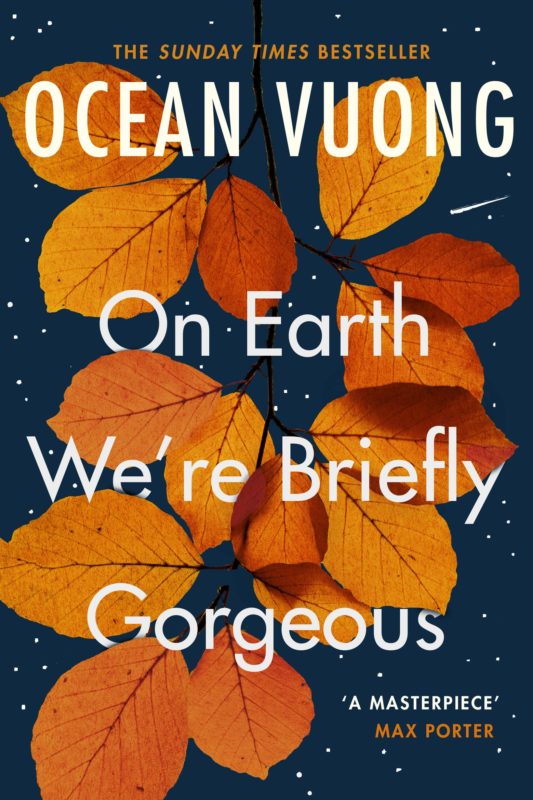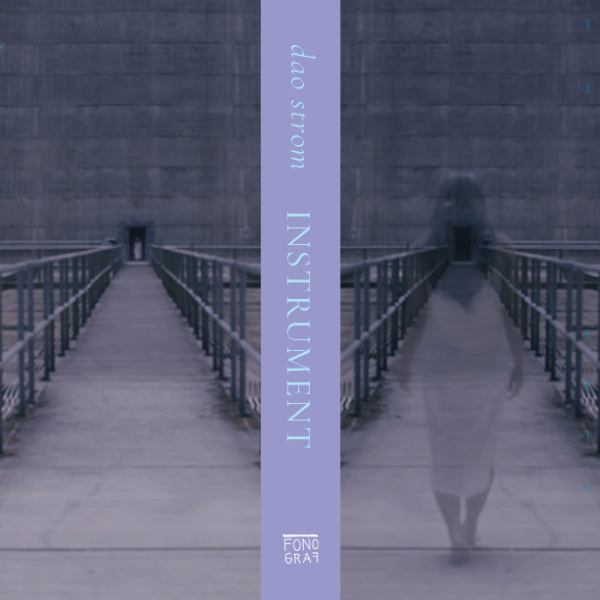Through the DVAN membership program, I received note of this reading by Ocean Vuong hosted by the PNCA (Pacific Northwest College of Art) creative writing program. During this virtual event, Ocean read parts of his best-selling novel On Earth We’re Briefly Gorgeous and two poems. It was then followed by an intimate conversation between Ocean and She Who Has No Master(s) Creative Director Dao Strom. This interview has been edited for clarity and length.
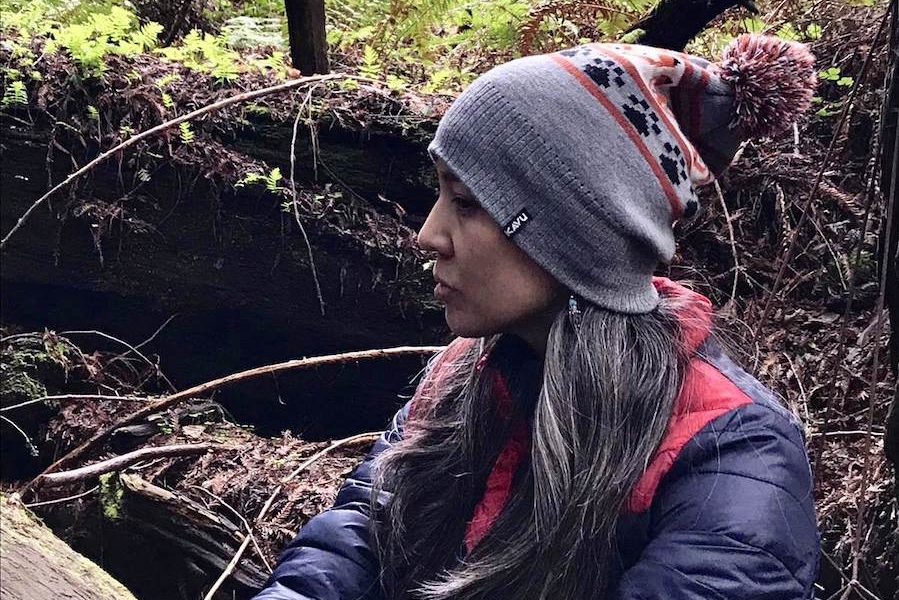
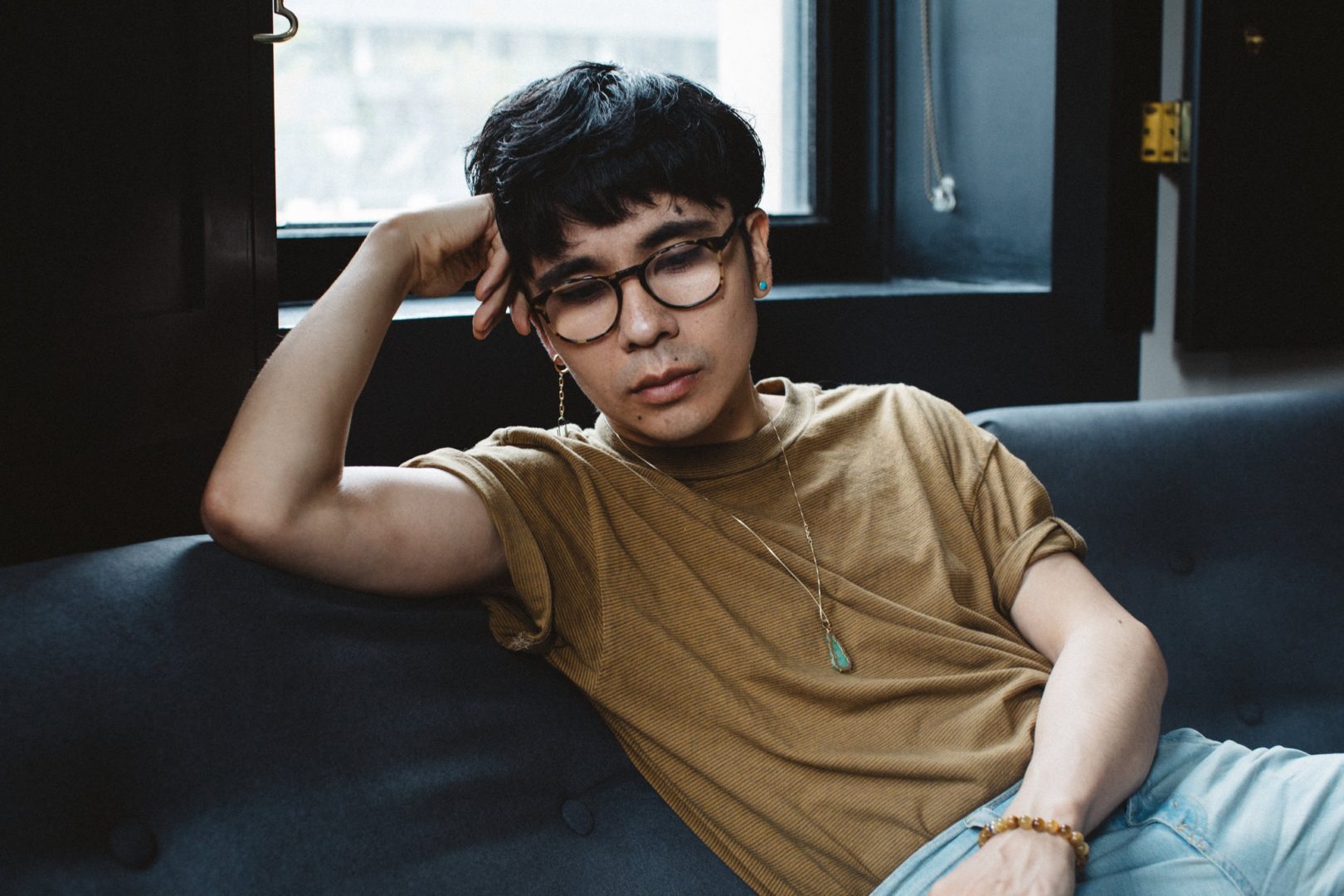
Dao Strom: I wrote down a couple of lines that you had shared with us. “The body being the only material to work with and work from. Yellow pain pressed into American letters turns to gold. Because we’ll need sorcery to make it out of here. Do you know how many hours I’ve wasted watching straight boys play video games? I know the room you’ve been crying in is called America.” This is beautiful work. Thank you.
I have some questions about poetics. You started in poetry, and you’ve moved to fiction. I’ve also written across the genres. I am curious about hearing how another writer navigates those differences. I watched some interviews and just picked out some things that you’ve said. I’ll start with this as sort of a big question, and it might be kind of abstract. I felt like some of the thematics in your poems are getting at this, too. You’ve talked in past interviews about genres as being fluid and you’ve talked about the queering of forms. In an interview you did with the novelist Viet Thanh Nguyen, you talked about not feeling fixed in poetry. You say that the larger question is, “How do I navigate the intersections of violence as an American body, a queer American body? I’m interested in what happens when form collapses, when it hits the point where it obliterates itself and yet it has to continue. My question for myself as an artist is: Now what? How will you honor total obliteration and still have a life to work with?” I’m curious about what this aesthetics of obliteration is, and this idea of the form collapsing on itself.
There was another quote: “In a lot of the Western canon, we ask for cohesion, particularly of queer bodies. And what I want to ask is: how can we write cohesive stories when our lives are not getting the privilege of cohesion? In order for a queer writer of color to write a cohesive story is to ultimately write a lie.” Even though I don’t identify as a queer writer, I feel like these are also questions that are relevant to Vietnamese writers and women of color. I guess I am just asking you to elaborate on some of those concepts. How do we work with form and obliterate it at the same time? How do you create it and sacrifice it at the same time? How does that serve the work that you’re doing and your mission and your stances, as a writer and artist in this country especially?
Ocean Vuong: Yeah. Beautiful. Thank you so much. A lot of my thoughts you re-reiterated for me. As a person, I’m always changing and developing and hopefully growing for the better. Sometimes, my thinking takes several steps back, in the wrong direction. And I’m trying to be more open to the dead ends and following thoughts into dead ends. Who knows where or what I will be thinking next year.
I’ve always felt that the genre is form. My heroes were more esoteric in the literary zeitgeist, so I’m still perplexed that the novel is a “bestseller.” Because my heroes weren’t, like Theresa Hak Kyung Cha, Bhanu Kapil, and Hoa Nguyen. The folks that I turn to see form as an oblique and necessary way of opposition. Turning, refusing. So much of form, particularly in poetry and particularly in the lyric, has been politicized in such a deftly and strategically potent way by so many women of color, with Claudia Rankine among them. Even Gwendolyn Brooks has this novel Maud Martha that so few people know about. But it was a precursor for Marguerite Duras’ The Lover. So, this vignette form which I’m always interested in. At heart, I see genre and the literary experiment as an experiment.
And the question for myself was: how can I re-pose the questions I had asked in Night Sky with Exit Wounds in a different form, in a different genre, and see if it would give anything. What would it yield? When I wrote Night Sky, a lot of my peers and editors said, “Well, you wrote the Vietnam book. Now what?” Well, first of all, it comes out of Vietnam but it’s an American book. It’s interrogating American violence. There’s this notion that a writer must reinvent themselves right away in order to present—to commodify or re-commodify—as a fresh new product, now better tasting. I really wanted to resist that. I stubbornly just said, “How dare I even claim that 90 pages of poetry in paperback exhaust these questions?” How could that be? How could that be? My elders who raised me have never exhausted their questions. I mean, they talk about the same things that have fashioned the disorientation of the diaspora, of imperialism, of being the aftermath, of being the relic of that.
The questions that I saw them live, I tried to articulate in my works, which is: what is the use of joy in the aftermath of violence? More specifically, how do women, particularly Vietnamese women, manifest care when often it is men who create these wars? And it is women across our species who literally clean up and pick up the pieces. When you go back to Sophocles’ Antigone burying her brother’s body, I felt that very deeply in the women. I wanted prose to tend to them in ways that poetry couldn’t because the elongation of prose forces you to stay in the scene. You have to follow the body after certain high dramatic points when they’re asleep. How do they tend to themselves? How do they relieve themselves? How do they feed themselves? It felt important to not write a novel about just woman warriors who are romanticized and courageous. Of course they’re courageous. But they weren’t just this one-dimensional wonder woman.
The question I was interested in is: what is the cost of care? We see this in service workers. That for so many Asian American women, particularly Southeast Asian American women, their care is no longer attached to their person. Their care is commodified away from them. You see this in the shooting in Atlanta where the shooter, the murderer, said, “I had a sex addiction.” The service that these women provide is now commodified away from them. So, their actions are amputated from their selfhood. The erasure and the invisibility of selfhood is so central and ongoing and pervasive in the fashioning and the mis-fashioning of Asian American identity in this country.
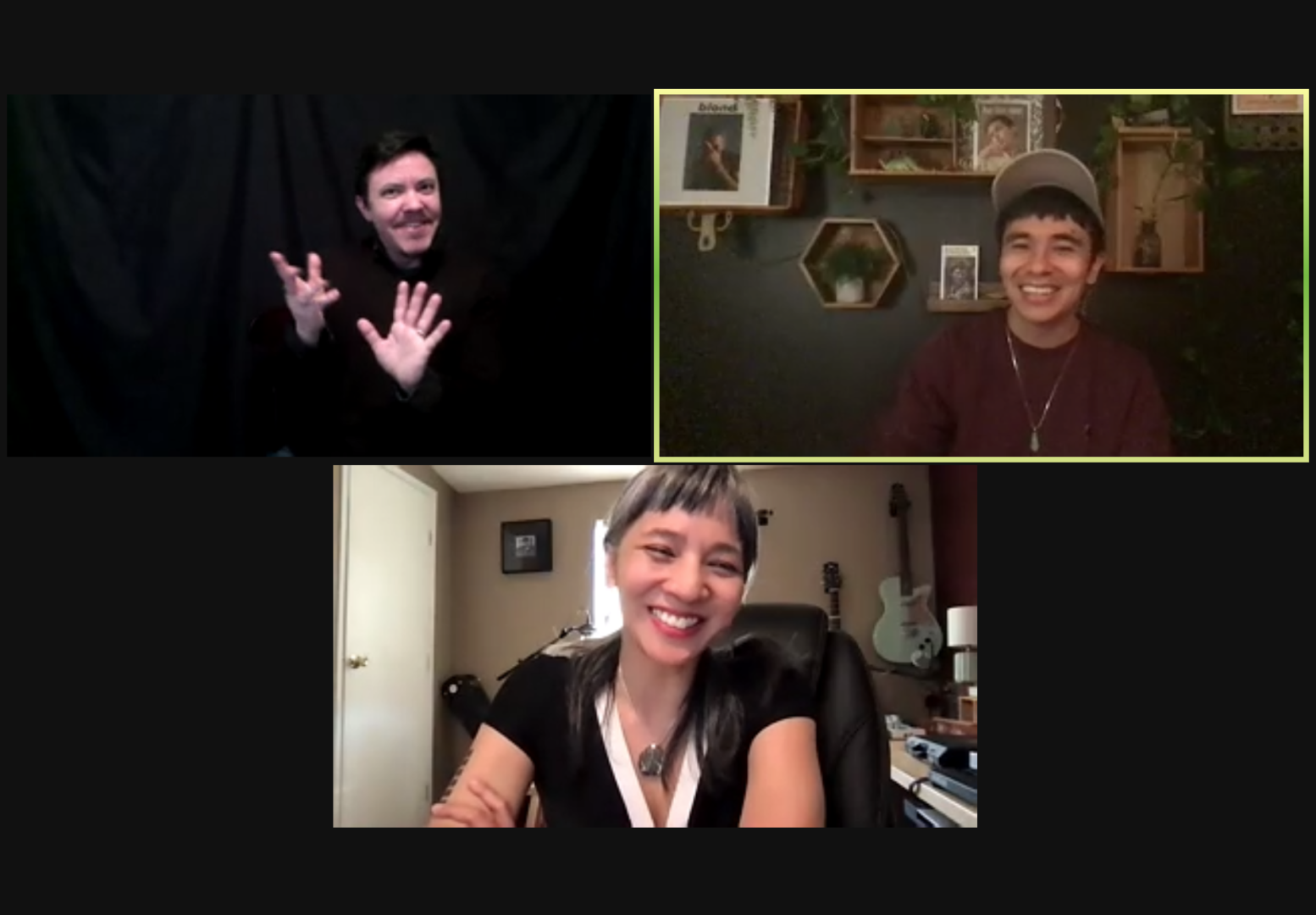
Dao: Yeah. I think you’re touching on something that I observed in the novel. Without giving away the ending, it ends on a line that centers the mother in an empowering and endearing way. There’s so much in that. About elongating time, I wanted to ask about time in the different genres. For myself, that’s one of the differences I’ve encountered. I’ve moved from fiction into poetry and found it liberating to be freed from time, and to feel free from linearity and the obligation or the necessity of establishing a backstory or context. You can lift this one moment and you can amplify it. Or you can take a larger experience and distill it into a single detail. For you, how does that work between those genres? What did you find about navigating time?
Ocean: Beautiful. I found that, in some ways, it was incredibly difficult to write prose as a poet. On the other hand, I learned a lot from poetry that helped me write this book, for better or for worse. I think we segregated the genres, more so in America than in other traditions. In Vietnam, the oral tradition is elusive. Is it rhyming, folk poems, or is it a parable, or is it a story? All these things are already blurred in the oral tradition (in a way, the material reality of the book demands segregation), but it was always complicated and muddled in a very beautiful way. I started this book with a lyric, a fragmented utterance. The first chapter begins like debris. There’s very little footing, there’s very little backstory, it just starts to happen. I tried to pull the strategies of poetry into prose and to just watch how it situates.
This is actually nothing too uncommon. Like I said about Theresa Hak Kyung Cha’s Dictee. But also in Melville, the supposed pillar of American fiction, who was using Shakespeare’s plays. Melville was a poet himself who wrote more lines of poetry than Whitman and Dickinson combined, particularly after writing Moby Dick. It felt very natural to move, but it was very difficult. Like you said about time. I remember practicing. I wrote about 200 pages of just short stories to practice. They’re like laboratories. My biggest challenge was moving bodies from room to room, like writing, “and he opened the door.” As a poet, it’s so hard to leave that on the page because we usually cut that out. I felt like I was committing a crime as a poet. He opened the door…and that’s it? There’s nothing else? I wanted to go off on this lyrical tangent. But I learned that these very utilitarian bricks of prose help situate and amplify the more dramatic moments. That was very difficult for me, but I wanted to do that. I hoped that prose would give me or force me to look at things longer. And in that sense, it kept its promise.
Dao: There’s a certain mystery in writing poetry. Like, I don’t know where I’m going, or something just arrives. Was that the same for you in the novel, or was it a more of a strategic experience? There’s obviously a story and there’s characters. Did you already have in mind what was going to happen to them beforehand?
Ocean: Very vaguely. This book is very different from, maybe, a traditional novel. I would like to write a traditional novel, but I wanted to write this book first. Because this book is arranged with the strategy of an essay collection. So here are labor and work, and here is violence or love or attempts at tenderness amidst violence, and here is grief. In a way, it’s like a poetry collection in the way it’s strategized. I wanted to do that to avoid, particularly in the debut, driving the tour bus. “Get on the tour bus and I’m going to show you Vietnamese American suffering.” I wanted instead to present a portrait gallery of these people. And that is James Baldwin’s Go Tell It on the Mountain. That book was so radical to me because a lot of folks expected Baldwin to tell Harlem. “Let’s take a ride and see how folks live, particularly how Black folks live, in Harlem.” Baldwin foresaw that and subverted it. He loaded everyone on the tour bus, and then he said, “I don’t know how to drive.” Instead, I am going to tell you about the Great Migration, and how a Black family is fashioned through portraits of people. He turned that tour bus—what was supposed to be or what people want to be a tour bus—into a portrait gallery. That’s what I wanted to do with this novel. It feels more like an artist’s statement disguised as a novel. It was important for me to articulate an aesthetic and ethical vision, rather than just tell folks, “get on the ride, sit back and relax, and let me tell you about how it is.” I didn’t want it to be an anthropological conduit.
Dao: I hear that. That question of how our trauma and our stories are commodified by publishing or by expectations. There’s also this way of thinking that you understand a group because you understand their trauma. That you see or grasp them through that trauma. You had a beautiful answer. By not engaging with these binary concepts.
I want to ask you about language. We’re both Vietnamese writers, but I’m actually not fluent in the language. I grew up with a white father, and there are a lot of reasons why my mother was not able to pass that language onto us. That’s another product of diaspora and division, just circumstances that are larger than our individual choices. I believe you’re fluent in Vietnamese. Of course, as American writers and writers of color, we’re working primarily in English. There’s this great quote by Robin Coste Lewis, where she talks about using English and the point at which writers of color are turning English on itself. She says, “The history of English is inextricably tied to the history of war, to the history of empire; they cannot be separated. And hence our literature cannot be separated from these histories. Language is one of the most powerful weapons of war. It’s also one of the war’s first victims.”
I wonder how you work with English or how you reconcile working with English: coming from a Vietnamese speaking background, knowing the complexities that are involved in our dynamics of language, specifically, the techniques or aesthetic approaches to it. Do you think about it consciously, or is it just something that happens?
Ocean: Absolutely. I don’t know if you have to, but you should think about the material consciously. I think a painter would worry about what kind of paint she was using. It’s very fraught. But because of this awareness of its fraughtness, it helps me see language as a site of interrogation rather than just a means towards a destination. If you’re a chef, the difference is in saying, “Where’s my food coming from? How am I sourcing my ingredients?” rather than just saying, “What am I going to make?” The power in having an awareness of English as violent histories helps me re-examine and re-purpose it in more useful ways. In that sense, I see myself as a junkyard artist who looks at language and re-casts it.
You see that in these newer poems, the language is very simple. The dominant strategy is the sentence. But through proximity and through arrangement, their meanings are amplified differently. I’m interested in seeing how things are cast in sequence, how sequencing can change meaning. And I think that’s a very exciting thing for all languages. Particularly in English, because where the violence occurs does not mean that the language ends there. It’s not fossilized at the site of harm. It can be renovated, repaired, healed even.
We see this in how we use the word “queer.” But we can still acknowledge what certain words do to folks. I live in North Hampton in the Northeast, and we are a very queer area. It’s an incredible thing. I feel very grateful to be surrounded by so many beautiful people. But also, it’s intergenerational. Some of our communities say,“I don’t want to use the word ‘queer.’ That word is triggering to me. That word has been used to destroy so much of myself.” As a community, we can, “Oh, absolutely. You know however you want to live and thrive. And if I love you enough to accommodate that, I can do that. I won’t use that word.” It’s about being able to shift as people alongside the shifting of language, and to accommodate as many people as we can. I think that is so central. A lot of folks of color have been creating vernaculars, creating figures of speech that innovate on the language—particularly in the Black community—creating different ways of thinking. Henry Louis Gates talks about how “slang” was actually a subversive way to talk about things outside of the white ear in order to survive.
The innovation of language depends on our interrogation of what standardization is and of standardization as a weapon of exclusion. What is the standard, what is the origin? Which is also a very Western sort of obsession. What I love about Buddhism, for example, is that there are no origin stories. I go to the temple and ask the monk, “What’s our origin story? Come on, everybody’s got an origin story.” My abbot turns to me and says, “How would that help you?” I was like, “Oh my god.” That’s the question that I want to keep. When it comes to language, when it comes to building communities around language, I want to center that phrase, “How can that help you?” When we start to answer that, standardization loses importance. You know, it’s about people.
Dao: It is also a really non-hierarchical way of thinking. You’re almost positing a paradigm that’s hard to grasp. There’s no beginning. There’s no authentic. There’s no source.
I wanted to ask you one last question about beauty. Because of what you’re saying about renovating the language and changing it into something else. I feel this may be current in your work too, about choosing to beautify. That might not be the right word. But rather than destroy, you would make the language. We can cut it up, we can mutate it, or we can turn it into something more beautiful. I don’t know if that resonates with you.
Ocean: Yeah. Beauty, of course, is subjective. But the quest for it is what I’m interested in, the questing for beauty. Every artist will have their own version of it. Francis Bacon’s grotesque and eerie paintings, to me, they’re beautiful. The quest for it is more important, and centering it is something this country doesn’t do. It sees beauty as superfluous and, at worst, suspicious. This is also where, again, Asian Americans are tied into it. That the ideal of feminization is culled and appropriated from the East. Only to devalue it. Just to say, “Well, it’s only beautiful.” Like the stereotype of Asian Americans as butterflies and as seductresses. Because when there’s only beauty, beauty becomes dangerous. Or useless. Defunct.
We see this in how figurative speech evolved in American letters through modernism. In the Victorian era, highly figurative or circuitous sentences—you know, Dickens, Melville, and Hawthorne—were seen as the tantamount achievement of male literary conquest. It coincides with manifest destiny. The expansionist Western movement was coinciding with Whitman’s elongated line, this aversion to the period. It was mimetic of American imperialism. But World War I happened, and the sublime—which was the Romantic mark—was no longer feasible amidst fields of the dead. So, Hemingway and Stein came through and said, “Now we have to sober up.” The Anglo tradition has to sober up and have a laconic line, a more mature, cold line.
But in order to do that, it had to render the previous techniques feminine, purple, flowery. In order to turn something defunct, it had to be feminized first. In order to discard something, it had to be rendered closest to womanhood. That’s why I chose it for this book. I wanted to perform a literary drag. This is the discarded feminized style, and I want to use it here and now when it’s not very popular. I’m not interested in the modernist conversation around figurative language or ornamental language. I’m more interested in other techniques. In Vietnamese, we use a lot of figures of speech, not to decorate the sentence, but to innovate around trauma. We were a country that had been at war for 2000 years, all the way since Kublai Khan. We fought them all, including this history of women fighting. So it is no wonder that we use the term “chính xác” for “clearly,” meaning “clear as a corpse.” What does that mean for a people to have that in the daily speech. So, I wanted to find alternative routes around that, and that’s the idea around language.
Dao: That’s really beautiful. Thank you. You were saying a lot about Asian American women and about the feminine. I don’t have the words for it. There are so many thoughts, especially right now. I want to thank you and acknowledge a lot of the thoughts that you’re sharing.
Ocean: Thank you for holding this space for us.
Q+A, read by Dao: “I’ve listened to your interview with Krista Tippett, where you speak about your embodiment practice. And after hearing you read, it made me wonder, sometimes it feels like your words are a spell that opens a door and invites your ancestors into the doorway where you stand. Does your embodiment practice shift to accommodate that mode? How do you make space in your body for your elders’ stories alongside your own? Thank you for being here.”
Ocean: I’m a Buddhist. We believe that we are the embodiment of our elders, and not just in a mythical way. If we think about Buddhist science, the genetics of the past. Our elders kind of wished us here. Their dreams and their desires propelled towards us. They manifested us. There’s a lot of talk about “manifest.” And it’s like we are the manifestations of our elders. Our elders wanted a better version of themselves. Sometimes they didn’t reach it in their lifetimes. I try to just honor it, but I also try not to romanticize our ancestors as if they’re just only here to rescue us. In Buddhism, we want them to go. It’s very complicated.
It’s like Interstellar, the way Buddhism works. That movie is actually very accurate. That movie is like the scientific explanation of what Buddhists have been believing for a long time. We believe that you reincarnate in one timeline. So, there’s the timeline, and it’s a piece of paper. Once you’re forced to go along this timeline, and once you pass away, your body is no longer obligated to this piece of paper, this timeline. And so, it folds. Now that’s time travel. The body has to eject from the timeline, and it could travel. We see our ancestors, even though in one timeline they’ve carried on. But we see them because when the body is no longer holding the spirit, it can travel. It’s very real. I don’t call on them for help. You don’t want to. Let them live. But I acknowledge that their existence is palpable. And I try to make the best of my time and to do my work as best as I can to honor what they’ve done. But I don’t use or call on them because they have their own lives.
Dao: Yeah. It’s a lot of debt. A lot for the ancestors to carry.
Q+A, read by Dao: “In On Earth We’re Briefly Gorgeous, one of the most impactful lines for me is, ‘we were real.’ I heard an echo of this in one of your new poems, ‘I was here.’ I want to ask about how you see or use poetry and prose as an archive of queer existence?”
Ocean: I think I’m interested in that, but I don’t force it. I don’t look at literature, or at least my contribution, as a queer archive. But it ends up that way through how I enact my work because I’m not interested in this false notion of timelessness. I’ve had a lot of folks I’ve met along the way as a writer saying, “Get the plastic bag out of the poem because it’s not timeless.” It’s interesting because the plastic is actually incredibly timeless. It stays forever and it destroys our planet. It’s very timeless. [Laughs].
I’m interested in being a sum total of the culture. Not consciously, but just writing out of that culture. I think the New York School and also Amiri Baraka, his contribution to that mode, really helped at least American poetics reconsider what is suitable for a poem. It disrupted and expanded what was possible. But also Gwendolyn Brooks before that, with The Bean Eaters. We knew that people lived in these tenements in this way, that you had to go down the hall to use the bathroom and shower. In her beautiful poem about working class folks, cooking dinner, the smell of onions. Those are incredible archives. But they’re not nearly so, right? I don’t want to approach my work and say, “Well, it’s just an archive.” Because there’s real archival work that centers the project of documentation, and that is where those things are, at least deliberately, done. And I don’t want to claim that space because that’s a whole different art form that I’m not necessarily practicing.
Dao: Thank you so much Ocean. It was such a pleasure to talk to you.
Ocean: Thank you all. I hope I’ll see you all in person one day.
The virtual event was co-hosted by PNCA’s MFA Low-Residency Creative Writing and MA Critical Studies programs and has been made possible by a generous grant from the Collins Foundation.
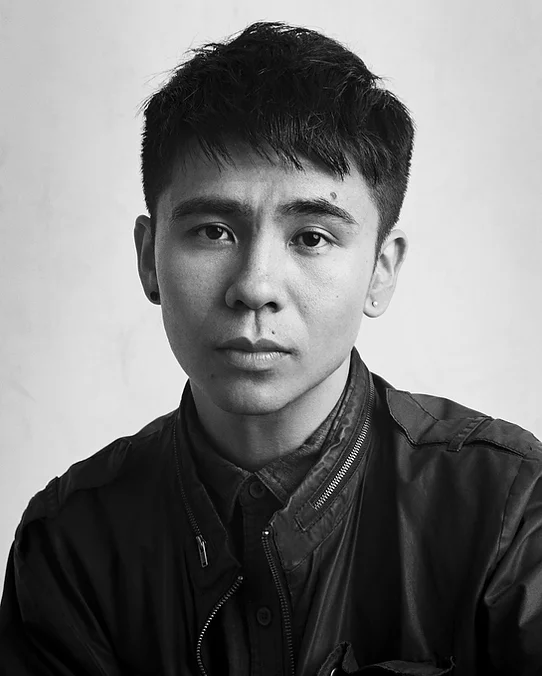
Ocean Vuong is the author of The New York Times bestselling novel, On Earth We’re Briefly Gorgeous, out from Penguin Press (2019) and forthcoming in 30 languages. A recipient of a 2019 MacArthur “Genius” Grant, he is also the author of the critically acclaimed poetry collection, Night Sky with Exit Wounds, a New York Times Top 10 Book of 2016, winner of the T.S. Eliot Prize, the Whiting Award, the Thom Gunn Award, and the Forward Prize for Best First Collection. A Ruth Lilly fellow from the Poetry Foundation, his honors include fellowships from the Lannan Foundation, the Civitella Ranieri Foundation, The Elizabeth George Foundation, The Academy of American Poets, and the Pushcart Prize. https://www.oceanvuong.com/
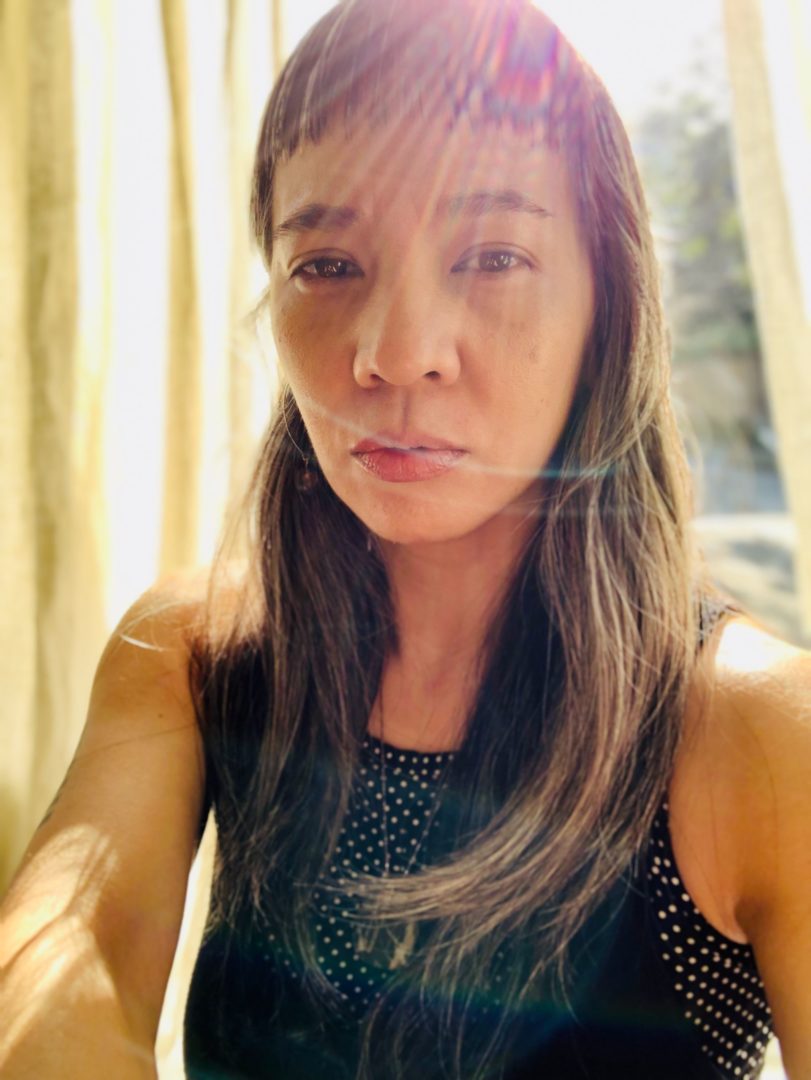
Dao Strom is the author of the poetry collection, Instrument (Fonograf Editions, 2020), and its musical companion piece, Traveler’s Ode (Antiquated Future Records, 2020). Her other works include You Will Always Be Someone From Somewhere Else, We Were Meant To Be a Gentle People, The Gentle Order of Girls and Boys, and Grass Roof, Tin Roof; and a song-cycle, East/West. She is the co-founder and creative director of the collective project, She Who Has No Master(s). www.daostrom.com
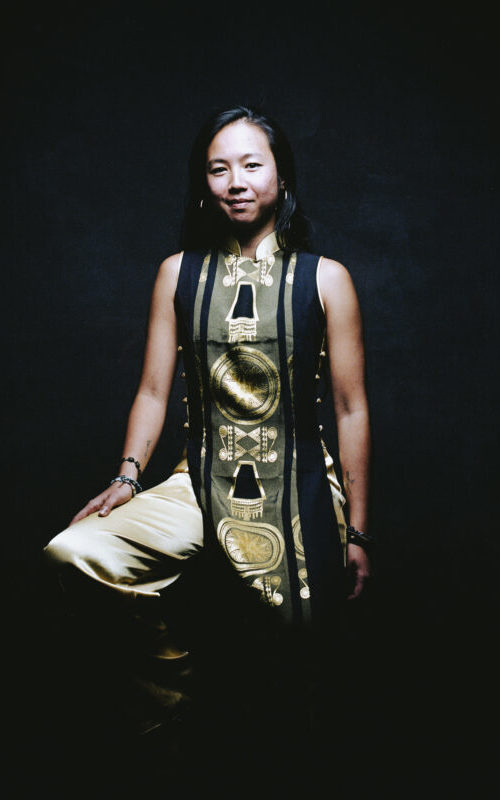
Born in Germany, Thị Minh Huyền Nguyễn is a Vietnamese writer, athlete and activist. She started Gold to Green, an online publication and podcast at the intersections of health, running, sustainability and culture in 2011. Having studied and worked in New York City, Huyen has co-founded WocForward in Brooklyn (a monthly exercise club for and by womxn of color) and Wayv Run Kollektiv back in Berlin to elevate queer, Black and brown, underrepresented runners. When Huyen is not writing or running, she’s pursuing a master’s in media science and involved in anti-racism / discrimination projects such as ichbinkeinvirus.org and biwoc-rising.org.



